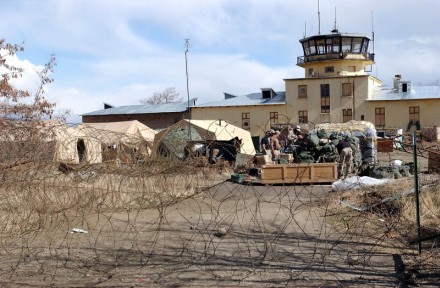WASHINGTON – Three $100 million air base expansions in southern and northern Afghanistan illustrate Pentagon plans to continue building multimillion-dollar facilities in that country to support increased U.S. military operations well into the future.

Bagram Air Base in Afghanistan.
Despite growing public unhappiness with the Afghan war – and President Barack Obama's pledge that he will begin withdrawing troops in July – many of the installations being built in Afghanistan have extended time horizons. None of the three expansion projects is expected to be completed until the latter half of 2011. All of them are for use by U.S. forces rather than their Afghan counterparts.
Overall, requests for $1.3 billion in additional fiscal-2011 funds for construction of military facilities in Afghanistan are pending before Congress. The House has approved the money, but the Senate hasn't voted on the measure.
In addition, the U.S. has already allocated $5.3 billion to build facilities for the Afghan army and the national police.
"We're only about 25 percent complete in our construction [for Afghan security forces], and there is quite a bit more to go over the next three years," Col. Mike Wehr, engineer director of the combined NATO training mission, told a defense bloggers roundtable recently.
The three bases being expanded for U.S. use after 2011 reflect the expectation of continued combat operations, but they are just part of a broader expansion of U.S. facilities across the country.
North of Kabul, the Pentagon is planning a $100 million project at Shindand Air Base.
Another $100 million project is planned for the air field at Camp Dwyer, a Marine base in Helmand province.
Contractor proposals were also due last week for a third $100 million project, this one at Mazar-e Sharif.
Meanwhile on Sunday, Afghan President Hamid Karzai said on ABC's This Week With Christiane Amanpour that he had personally intervened to free a top political aide who had been detained on graft charges by two U.S.-backed Afghan anti-corruption units. The aide, Mohammed Zia Saleh, was later released on the order of the attorney general's office.
"I intervened very, very strongly," Karzai said. He criticized the arrest of Saleh, saying his rights were violated.



